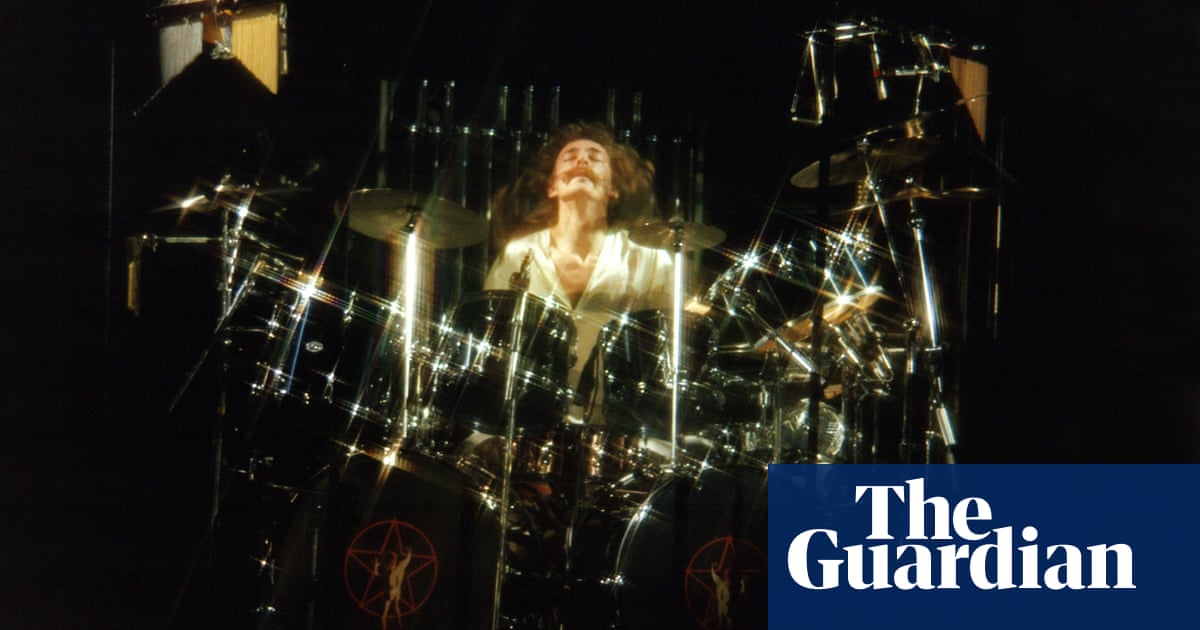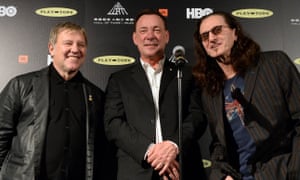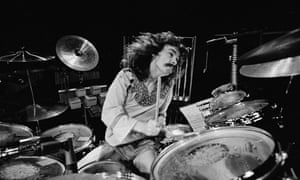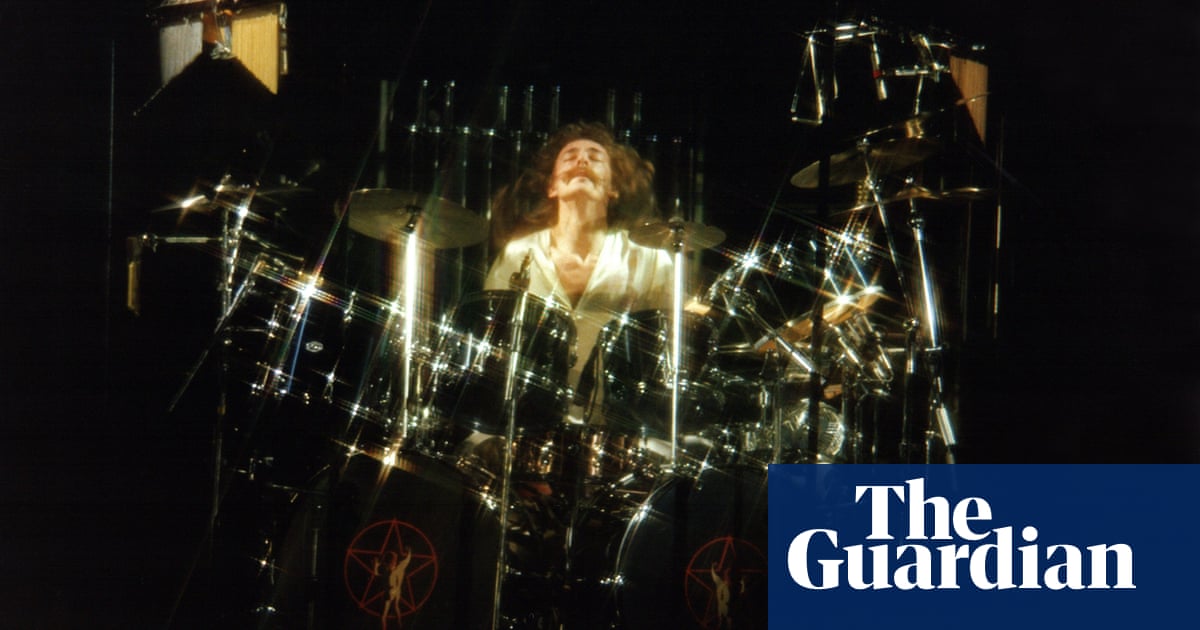The Rush drummer, who has died at 67, was worshipped by fans and beloved by friends

He was one of the goofiest-looking guys Id ever seen, Geddy Lee told me in November 2018. Rushs singer and bass player was talking about his first encounter with Neil Peart, his bandmate from 29 July 1974 until their final gig in 2015, almost exactly 41 years later.
He was very tall, lanky, said Lee. And he had short hair. All of us had major hair. He had spent two years living in England before that. We didnt know this. But he had just moved back home and given up his dream of playing in a rock band. And he was working for his dads farm equipment store. He drove up in this little sports car, drums were hanging out from every corner. He comes in, this big goofy guy with a small drum kit with 18-inch bass drums. Alex [Lifeson] and I were chuckling we thought he was a hick from the country. And then he sat down behind this kit and pummelled the drums, and us. Id never heard a drummer like that, someone with that power and dexterity. As far as I was concerned, he was hired from the minute he started playing.
But Neil Peart was rather more than a drummer (and Rushs lyricist). He was extremely reticent and not prone to shouting his mouth off in interviews. He was not one for the life of the rock star: rather than reclining in tour buses, he would travel between Rush shows on his bicycle, then later his motorbike, stopping unrecognised at roadside diners for his lunch.

He was a family man who lost his daughter in a road traffic accident and his wife to cancer within 10 months of each other, in 1997 and 1998, and whose response to those tragedies was to teach himself to cook, first to care for his wife, then for himself (touchingly, in his memoir Ghost Rider: Travels on the Healing Road, he offered thanks to the food hall in the Marks and Spencer in Oxford Street, which offered cooking instructions with every item, even fresh fish and vegetables.)
More than a drummer, Neil Peart was loved.
He was loved by Lee and Lifeson, which was evident in the delightful documentary Rush: Beyond the Lighted Stage. And he was loved by pretty much everyone who ever took the slightest interest in Rush, because he was so clearly not a rock star, but a bookish, shy chap, who happened to possess extraordinary dexterity on drums.
You could get a sense of this from his lyrics, which, for all the focus on his young love of Ayn Rand, often had an air of loneliness and separation, never more clearly than on Subdivisions, the song the Smiths might have written had they been a Canadian prog power trio: In the high school halls / In the shopping malls / Conform or be cast out / Subdivisions / In the basement bars / In the backs of cars / Be cool or be cast out.
His lyrics, whether or not you liked them, were written with a plain-spoken and full-hearted honesty that meant they were sometimes extraordinarily on the nose, but could equally hit home with force. Rushs biggest UK hit single, The Spirit of Radio (No 13, 1980), managed to be simultaneously a hymn to the old-fashioned notion of hearing a song on the radio that might transport you (Emotional feedback/ On a timeless wavelength / Bearing a gift beyond price), a defence of musical technology against the Luddites who insist on the old way of doing things (All this machinery / Making modern music / Can still be open-hearted) and a tirade against those who would corrupt art with money (For the words of the prophets / Were written on the studio wall / Concert hall / And echoes with the sounds of salesmen). The key thing, Peart insisted in a the song, was that its really just a question of your honesty.
Like a lot of other people, I fell hard for Rush in my early teens, when what I thought was significant about them was that they had songs based on Coleridge poems, or that they had tracks that occupied entire sides of albums and had overtures. Only later did I realise that what really mattered was that three men could navigate all the vicissitudes of a career in the music industry and remain true to what they wanted to do, entirely uncompromised, and still be friends.
But back then, in the early 80s, I used to sit with my friend Ian Watts in his bedroom in Windsor listening to Rush albums A Farewell to Kings, 2112, Hemispheres, All the Worlds a Stage and marvelling, above all, at Pearts drumming. At the way he seemed to make his way from one side of his enormous kit to the other in micro-seconds, touching every bit of it toms, tubular bells, gongs, cowbells, windchimes, cymbals of every kind. At the way he sounded like thunder. His kits themselves looked less like musical instruments than pieces of an industrial plant (of course there is a website that details each kit from every stage of his career).

There has, in fact, probably never been a band that so embodied the mindset of a particular kind of teenage boy (I know women liked them, too, but early Rush were a boys band. Really) as Rush did with their run of albums of the late 1970s. But they grew up, and Peart did, too.
That was apparent throughout the 1980s, and especially on Vapor Trails, from 2002, the first album Rush recorded after the death of Pearts daughter and wife. His tragedy and his recovery from it haunts the album. In Ghost Rider, he is Just an escape artist / Racing against the night; in Vapor Trail he sings of Memory written on the wind / Washed away like footprints in the rain. But it wasnt lachrymose. The albums opening track, One Little Victory, was about the fact that he had been able to return to music and to his friends after years away, spent riding alone around North America confronting his grief: Celebrate the moment / As it turns into one more / Another chance at victory / Another chance to score. Victory was getting from one day to the next, until it was no longer a struggle.
The last thing I asked Geddy Lee when I met him just over a year ago was whether he and Lifeson and Peart were still friends, now they no longer had Rush to hold them together. Absolutely, he said. Alex and I just flew down to see Neil two weeks ago and hung out for three days. Had some very good meals. Were pals, and that will never change.
It makes my eyes well, truly, to think that hes lost his pal.
Read more: https://www.theguardian.com/music/2020/jan/10/neil-peart-dead-rush-drummer-appreciation


Recent Comments